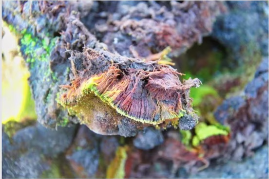Indian scientists discover new species of moss in Antarctica
It took scientists five years to confirm the moss belonged to a species discovered for the first time

Your support helps us to tell the story
From reproductive rights to climate change to Big Tech, The Independent is on the ground when the story is developing. Whether it's investigating the financials of Elon Musk's pro-Trump PAC or producing our latest documentary, 'The A Word', which shines a light on the American women fighting for reproductive rights, we know how important it is to parse out the facts from the messaging.
At such a critical moment in US history, we need reporters on the ground. Your donation allows us to keep sending journalists to speak to both sides of the story.
The Independent is trusted by Americans across the entire political spectrum. And unlike many other quality news outlets, we choose not to lock Americans out of our reporting and analysis with paywalls. We believe quality journalism should be available to everyone, paid for by those who can afford it.
Your support makes all the difference.Indian scientists from the Central University of Punjab have discovered a new moss species in eastern Antarctica, something which took the scientists five years to confirm.
The scientists have named the moss Bryum bharatiensis after Bharat, one of India’s research stations in the continent. The station itself is named after Hindu goddess Bharati, more popularly known as Saraswati.
The discovery by Indian scientists has been peer reviewed and accepted by the Journal of Asia-Pacific Biodiversity, a leading international journal, according to a BBC report.
The scientists first found the moss species during an expedition to Antarctica in 2017, after which they spent five years sequencing and comparing the moss DNA with other plants.
This is the first time India discovered a plant species since the research station was set up in Antarctica in 1984.
Felix Bast – who heads the Department of Botany at the Central University of Punjab in northern India – was part of the six-month-long expedition that found the dark-green species at the continent’s Larsemann Hills area, near the Bharati station in January 2017.
“The sampling was done in January, that is during the summer season in Antarctica. The 1.5- to 3 cm-long moss was seen growing in patches at several sites near the Bharati station. The spores of this moss remain dormant and survive severe winters,” Dr Bast was quoted as saying by the Indian Express newspaper.
Scientists, however, still don’t understand how plants survive the continent’s harsh climate during the winter months.
They say it is likely that the moss “dries up to a dormant stage, almost to a seed” at this time, and germinates again during summer in September when they begin getting sunlight again, according to the BBC. The dried-up moss then absorbs water from the melting snow.
There is also another unlikely source that contributes to the moss’s growth: penguin excreta.
The moss, thus, primarily grew in areas where penguins bred in large numbers. Penguin excreta – which has nitrogen and doesn’t decompose because of the climate – allowed the moss to survive, Dr Bast told the BBC.
“Antarctica is getting greenified. Many temperate species of plants that previously could not survive in this frozen continent are now seen everywhere because of the warming up of the continent,” he said.
“To be part of a six-month-long arduous Indian Antarctic mission itself is a huge privilege. At a personal level, this discovery is the fruit of this scientific mission,” Dr Bast said in another statement to local media in India.
More than 100 species of moss have been documented from Antarctica so far.
Join our commenting forum
Join thought-provoking conversations, follow other Independent readers and see their replies
Comments